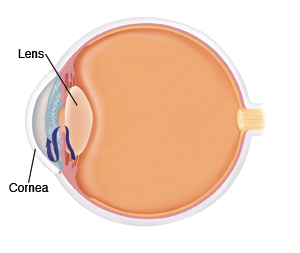Acute Narrow-Angle Glaucoma
The eye is a fluid-filled globe with a lens near the front. There is a light-sensitive screen in the back (retina). The optic nerve conducts light signals from the retina to the brain. It allows you to see. Eye fluid is constantly being made within the eye. Excess fluid drains out into the bloodstream.

Narrow-angle glaucoma (NAG) occurs when the eye’s fluid drainage system is blocked. The internal eye pressure then rises rapidly. The high pressure in the eye can damage the optic nerve. This can cause loss of vision. This is a medical emergency. If not treated right away, this condition may cause complete, permanent blindness within days.
The cause of the blockage may be a problem with the eye’s fluid drainage system that has been there since birth. Or the blockage may be a result of eye changes that happen as people get older. Narrow-angle glaucoma in one eye increases the risk for the same problem in the other eye. Your provider will talk with you about preventive treatment.
The symptoms of NAG appear quickly. You may have:
You may have another attack of NAG if your pupil becomes enlarged (dilated). Pupils dilate in darkness or dim light. They also dilate when you are stressed or excited. They can also dilate if you take certain medicines. These include antihistamines (like diphenhydramine), tricyclic antidepressants (like amitriptyline), and eye drops used to dilate your pupils. Be alert to the symptoms of NAG. Seek medical help at once if they come back.
Eye drops, pills, and intravenous medicines are often some of the first treatments used. Your eye care provider will likely advise surgery or laser treatment. These treatments help drain the fluid and reduce pressure in the eye.
Home care
-
Take medicines exactly as prescribed.
-
You may use acetaminophen or ibuprofen to control pain, unless another medicine was prescribed. Note: If you have chronic liver or kidney disease or have ever had a stomach ulcer or gastrointestinal bleeding, talk with your health care provider before using these medicines.
-
Don’t take medicines that dilate the pupil. This includes antihistamines, tricyclic antidepressants, and certain eye drops. Tell your eye care provider about all medicines you take. This includes vitamins, supplements, herbal remedies, and prescription and over-the-counter medicines.
-
Stress may trigger an attack of fluid blockage in the eye. Learn ways to manage your stress. There are books and information online on this topic. Or ask your provider for suggestions.
-
Protect your eyes. An eye injury can cause increased eye pressure. Wear safety glasses or goggles when you play sports, use tools or machinery, or work with chemicals.
Follow-up care
It's very important to make a follow-up appointment with an eye care provider (ophthalmologist) as soon as possible.
When to get medical advice
Go to your local hospital emergency room right away if you have:
-
Increasing eye pain, redness, or swelling.
-
Headache, nausea, vomiting.
-
Increased blurring of vision.
-
Halos around lights.
-
Loss of eyesight.